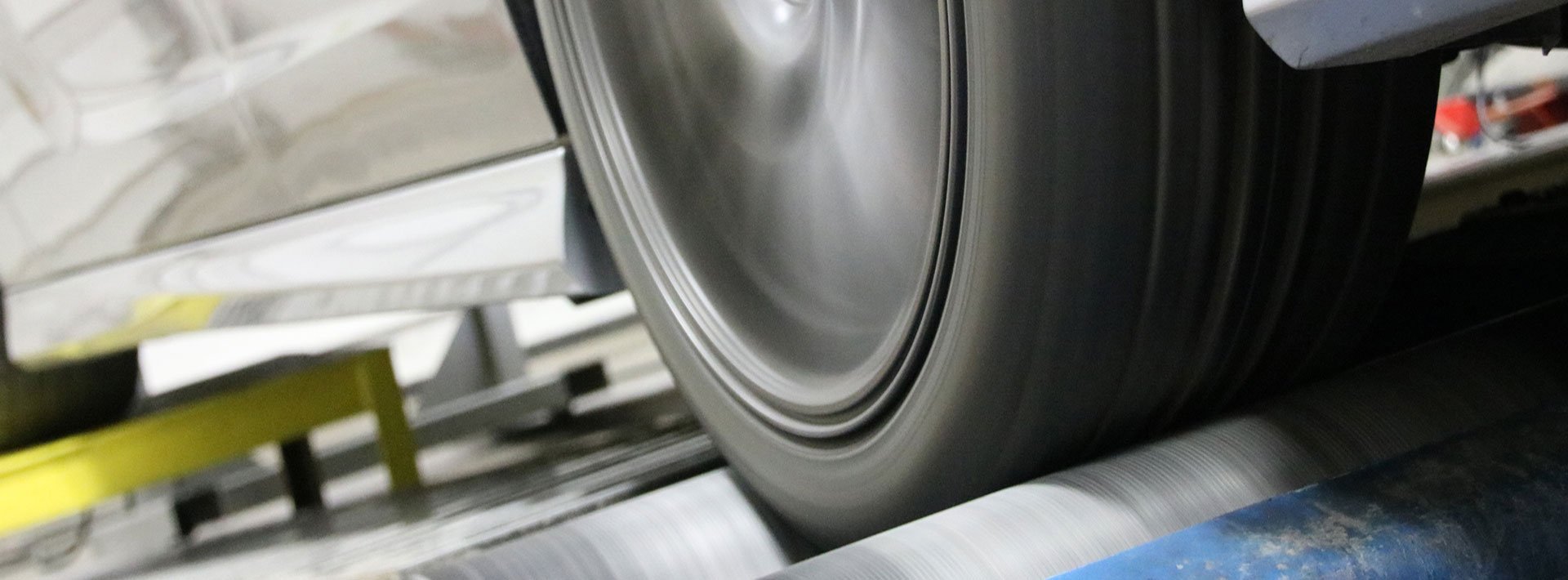SAE J267 Wheel Radial Impact Performance Test
The SAE J267 wheel radial impact performance test is a critical procedure designed to evaluate the durability and integrity of wheels under simulated real-world conditions. This test, as prescribed by the Society of Automotive Engineers (SAE), aims to ensure that wheels can withstand significant impacts without compromising their structural integrity or safety.
The primary focus of this test is to assess how well a wheel can handle a radial impact force applied at specific points on its rim. The test simulates the kind of stress that occurs when a vehicle hits an obstacle, such as a pothole or debris, during operation. This type of impact can exert high forces on the wheel, and the SAE J267 test helps manufacturers ensure their products are robust enough to perform reliably under these conditions.
The methodology involves placing a wheel onto a specialized machine that applies a predetermined force in a radial direction at specific locations on the rim. The wheel is then subjected to multiple cycles of this impact, and its behavior is monitored throughout the testing process. Compliance with the test requirements ensures that wheels meet the necessary standards for safety and performance.
The SAE J267 test is particularly important for ensuring the reliability of wheels used in various applications, including passenger vehicles, commercial trucks, and off-road vehicles. By adhering to this standard, manufacturers can demonstrate their commitment to quality and compliance with industry best practices.
One of the key aspects of the SAE J267 test is its ability to mimic real-world conditions accurately. This allows for a more precise evaluation of how wheels will perform in actual use, rather than relying solely on static or theoretical assessments. The test can help identify potential issues with wheel design and manufacturing processes that might otherwise go unnoticed.
In addition to assessing the physical strength of the wheel, the SAE J267 test also evaluates other critical factors such as deformation resistance, energy absorption, and overall structural integrity. By focusing on these parameters, manufacturers can ensure their wheels are not only strong but also capable of absorbing impact forces without significant damage.
The results of the SAE J267 wheel radial impact performance test provide valuable insights into the quality and safety of a wheel under specified conditions. These findings are essential for ensuring that wheels meet the necessary standards and perform reliably in real-world scenarios. The test is particularly important for manufacturers, quality managers, compliance officers, R&D engineers, and procurement teams who need to ensure their products meet stringent industry requirements.
The SAE J267 test is not just about passing a standard; it's about ensuring that wheels are safe and reliable under real-world conditions. By adhering to this rigorous testing protocol, manufacturers can build trust with consumers and meet the expectations of regulatory bodies worldwide.
Scope and Methodology
The SAE J267 wheel radial impact performance test is a comprehensive evaluation designed to assess the durability and integrity of wheels under simulated real-world conditions. The scope of this test includes the following key areas:
- Evaluation of radial impact resistance at specific points on the rim.
- Assessment of deformation resistance, energy absorption, and overall structural integrity.
- Evaluation of compliance with relevant international standards such as ISO 19402:2013 and SAE J267.
The methodology for conducting this test involves placing a wheel onto a specialized machine that applies a predetermined force in a radial direction at specific locations on the rim. The wheel is then subjected to multiple cycles of impact, and its behavior is monitored throughout the testing process. Compliance with the test requirements ensures that wheels meet the necessary standards for safety and performance.
The SAE J267 test is particularly important for ensuring the reliability of wheels used in various applications, including passenger vehicles, commercial trucks, and off-road vehicles. By adhering to this standard, manufacturers can demonstrate their commitment to quality and compliance with industry best practices.
Industry Applications
The SAE J267 wheel radial impact performance test has a wide range of applications across various industries. Here are some key areas where this test is particularly relevant:
- Automotive Manufacturing: Ensures that wheels used in passenger vehicles and commercial trucks can withstand the stress of real-world conditions.
- Off-Road Vehicles: Provides assurance that wheels for off-road vehicles are capable of handling harsh terrain and high-impact situations.
- Sporting Goods: Evaluates the durability of wheels used in sports equipment, such as bicycles or skateboards.
- Military Applications: Ensures that wheels used in military vehicles can withstand severe impacts and environmental stress.
The SAE J267 test is particularly important for manufacturers, quality managers, compliance officers, R&D engineers, and procurement teams who need to ensure their products meet stringent industry requirements. By adhering to this rigorous testing protocol, manufacturers can build trust with consumers and meet the expectations of regulatory bodies worldwide.
Eurolab Advantages
At Eurolab, we offer a comprehensive range of services for SAE J267 wheel radial impact performance tests. Our state-of-the-art facilities and experienced team ensure that your wheels meet the highest standards of quality and reliability.
- Accurate Testing Equipment: We use cutting-edge equipment to conduct precise and reliable tests, ensuring accurate results every time.
- Comprehensive Reporting: Our reports provide detailed insights into the performance of your wheels under specified conditions, helping you make informed decisions about product improvements.
- Expertise in Automotive Testing: With years of experience in automotive testing, our team is well-equipped to handle all aspects of SAE J267 testing.
- Regulatory Compliance: We ensure that your wheels meet all relevant international standards, including ISO 19402:2013 and SAE J267.
The SAE J267 test is not just about passing a standard; it's about ensuring that wheels are safe and reliable under real-world conditions. By adhering to this rigorous testing protocol, manufacturers can build trust with consumers and meet the expectations of regulatory bodies worldwide.





